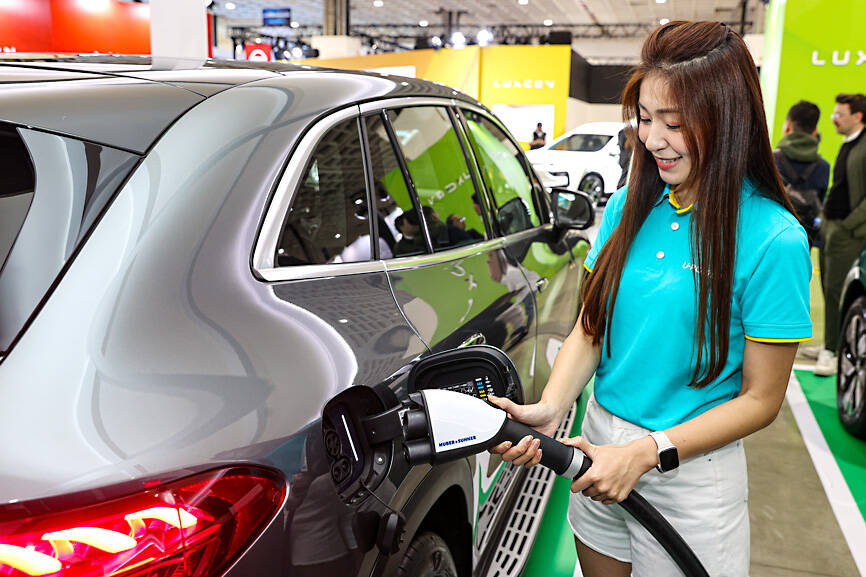The Taipei Auto Show opened on Thursday after a four-year hiatus, with car brands putting their hybrid and electric models front and center.
More than 100 vehicle models from more than 20 local and international brands are being presented at the five-day show, a biennial event last held from Dec. 28, 2019, to Jan. 5, 2020, the Taipei Automobile Distributors’ Association said.
In addition to a newly established exhibition of new-energy vehicles, including electric vehicles (EVs) and hybrid models, at the Nangang Exhibition Center in Taipei, the event is also being attended by companies in EV-related businesses, the association said in a statement on Wednesday.

Photo: CNA
Vehicle manufacturers at the show include Taiwan-based Luxgen, Aston Martin, Nissan, Lotus, Subaru, Vespa and Tesla, which for the first time are joined by EV charging solution providers such as Delta Electronics Co (台達電) and Yulon Group’s (裕隆集團) YES-Energy Service Co (裕電能源), the association said.
Gaming PC manufacturer Micro-Star International Co (MSI, 微星) is also displaying its EV chargers for home and commercial use.
Several car company executives on Thursday shared their views on the development of the EV market in Taiwan at the auto show.
Yulon Nissan Motor Co (裕隆日產) president Chung Wen-chuan (鐘文川) said he expected new-energy vehicles to take about a 25 to 30 percent share of the global car market by 2030.
There is a market for hybrid models in the short term, as the sector still needs to overcome the challenges posed by the high price of EVs and inconvenient charging infrastructure, he said.
Apart from the rising price of raw materials and components, EV production capacity has been restricted by the need for more chips and batteries in vehicles, leading to delayed deliveries, Chung said.
Two Japanese brands distributed by Hotai Motor Co (和泰汽車) in Taiwan, Lexus and Toyota, exhibited a wide range of hybrid and electric models.
Hotai spokesman Simon Liu (劉松山) said the Japanese brand has solved most of its issues surrounding chip supplies, but its production in Japan has reached full capacity, with the brand seeking to adjust production lines to improve output.
The high price of EVs is caused by a lack of economic scale, and limited sales, and if production can be expanded to meet higher demand, the price of such vehicles could drop to about NT$1 million (US$32,536) or lower, Liu said.
Liu said he also looked forward to the introduction of Toyota’s Mirai series, with electric and hybrid models, equipped with hydrogen fuel cells, displayed at the auto show.

MULTIFACETED: A task force has analyzed possible scenarios and created responses to assist domestic industries in dealing with US tariffs, the economics minister said The Executive Yuan is tomorrow to announce countermeasures to US President Donald Trump’s planned reciprocal tariffs, although the details of the plan would not be made public until Monday next week, Minister of Economic Affairs J.W. Kuo (郭智輝) said yesterday. The Cabinet established an economic and trade task force in November last year to deal with US trade and tariff related issues, Kuo told reporters outside the legislature in Taipei. The task force has been analyzing and evaluating all kinds of scenarios to identify suitable responses and determine how best to assist domestic industries in managing the effects of Trump’s tariffs, he

TIGHT-LIPPED: UMC said it had no merger plans at the moment, after Nikkei Asia reported that the firm and GlobalFoundries were considering restarting merger talks United Microelectronics Corp (UMC, 聯電), the world’s No. 4 contract chipmaker, yesterday launched a new US$5 billion 12-inch chip factory in Singapore as part of its latest effort to diversify its manufacturing footprint amid growing geopolitical risks. The new factory, adjacent to UMC’s existing Singapore fab in the Pasir Res Wafer Fab Park, is scheduled to enter volume production next year, utilizing mature 22-nanometer and 28-nanometer process technologies, UMC said in a statement. The company plans to invest US$5 billion during the first phase of the new fab, which would have an installed capacity of 30,000 12-inch wafers per month, it said. The

Taiwan’s official purchasing managers’ index (PMI) last month rose 0.2 percentage points to 54.2, in a second consecutive month of expansion, thanks to front-loading demand intended to avoid potential US tariff hikes, the Chung-Hua Institution for Economic Research (CIER, 中華經濟研究院) said yesterday. While short-term demand appeared robust, uncertainties rose due to US President Donald Trump’s unpredictable trade policy, CIER president Lien Hsien-ming (連賢明) told a news conference in Taipei. Taiwan’s economy this year would be characterized by high-level fluctuations and the volatility would be wilder than most expect, Lien said Demand for electronics, particularly semiconductors, continues to benefit from US technology giants’ effort

‘SWASTICAR’: Tesla CEO Elon Musk’s close association with Donald Trump has prompted opponents to brand him a ‘Nazi’ and resulted in a dramatic drop in sales Demonstrators descended on Tesla Inc dealerships across the US, and in Europe and Canada on Saturday to protest company chief Elon Musk, who has amassed extraordinary power as a top adviser to US President Donald Trump. Waving signs with messages such as “Musk is stealing our money” and “Reclaim our country,” the protests largely took place peacefully following fiery episodes of vandalism on Tesla vehicles, dealerships and other facilities in recent weeks that US officials have denounced as terrorism. Hundreds rallied on Saturday outside the Tesla dealership in Manhattan. Some blasted Musk, the world’s richest man, while others demanded the shuttering of his